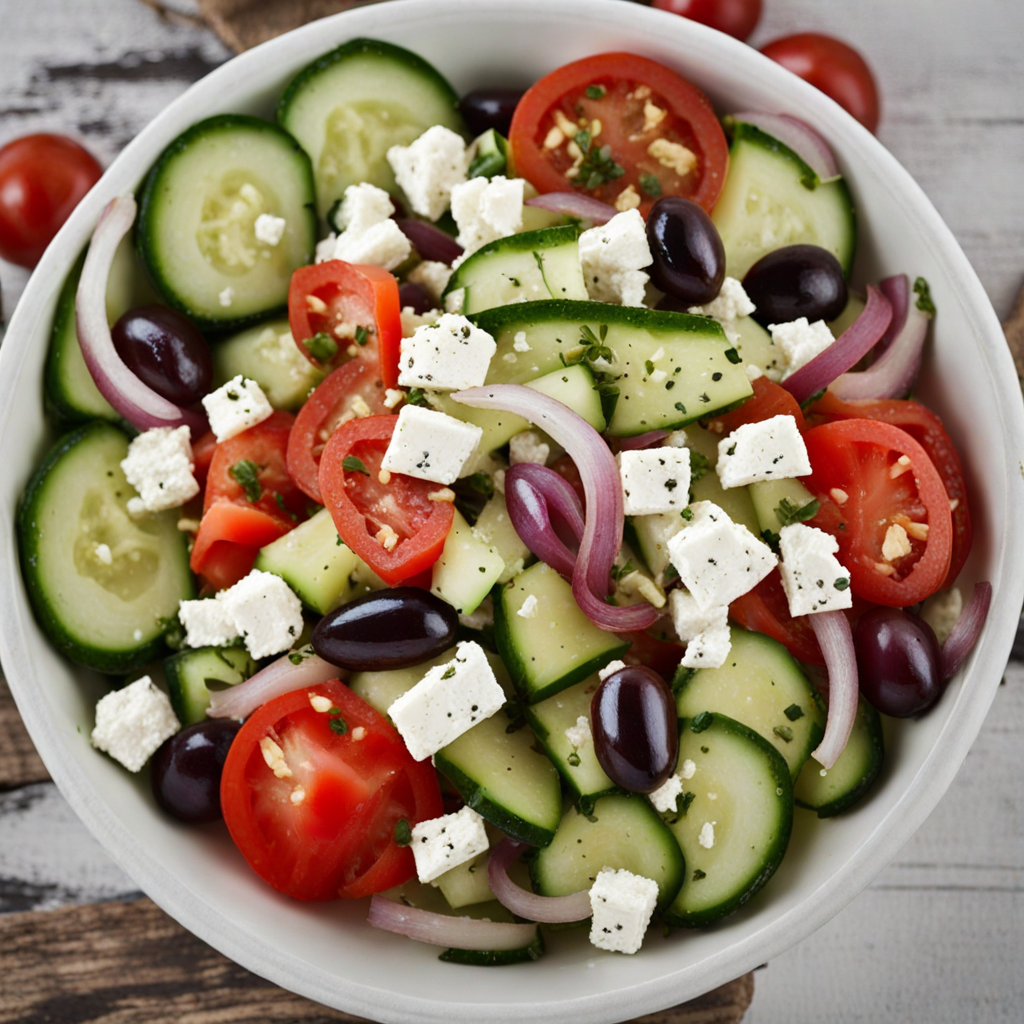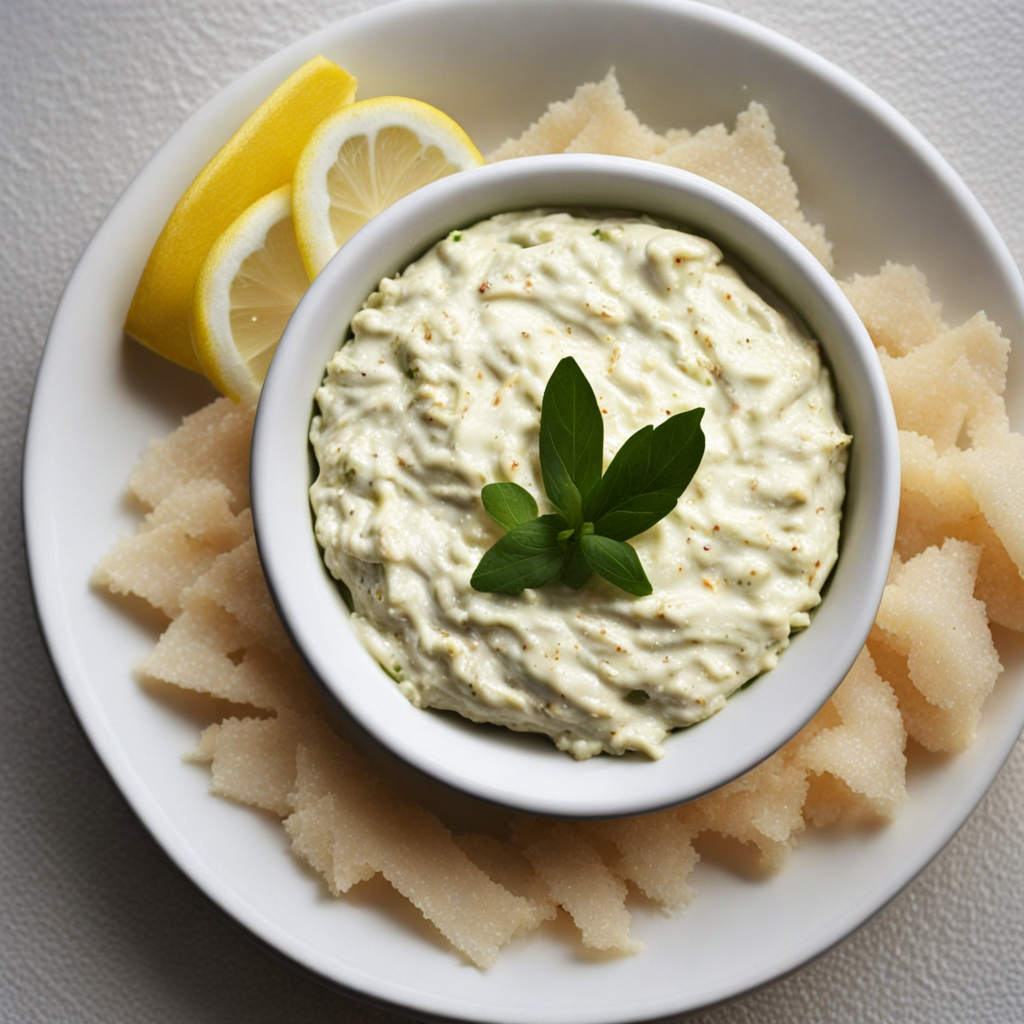Horiatiki
Horiatiki, often referred to as Greek salad, is a vibrant and refreshing dish that captures the essence of the Mediterranean diet. This rustic salad is made with ripe, juicy tomatoes, crisp cucumbers, red onions, and green bell peppers, all of which are diced into generous chunks. What sets Horiatiki apart from other salads is the addition of creamy feta cheese, which is either crumbled on top or served in large blocks, providing a tangy contrast to the fresh vegetables. A sprinkle of dried oregano adds an aromatic touch, while a drizzle of high-quality extra virgin olive oil perfectly enhances the flavors, making each bite a delightful experience. One of the most alluring aspects of Horiatiki is its simplicity and the quality of ingredients used. The vegetables are typically sourced from local markets, ensuring they are in season and bursting with flavor. This salad embodies the spirit of Greek cuisine, which emphasizes fresh, wholesome ingredients that are minimally processed. The crunch from the cucumbers, the sweetness of the tomatoes, and the saltiness of the feta create a harmonious balance that is both satisfying and invigorating. Horiatiki is not just a side dish; it can be enjoyed on its own as a light meal or paired with grilled meats and seafood for a more substantial feast. The salad is often served at room temperature, allowing the flavors to meld beautifully, making it an ideal choice for warm weather dining. Whether enjoyed in a bustling taverna in Greece or prepared at home, Horiatiki is a delightful way to explore the fresh, vibrant tastes that define Greek cuisine.
How It Became This Dish
The History of Χωριάτικη: A Culinary Tradition from Greece #### Origins Χωριάτικη, commonly known as Greek salad, is a dish that embodies the essence of Greek culinary tradition. The term "χωριάτικη" translates to "village salad," which hints at its rustic roots. The origins of this salad can be traced back to the rural areas of Greece, where local ingredients were utilized to create a meal that was both nourishing and refreshing. The components of Χωριάτικη reflect the agricultural bounty of Greece. Traditionally, it consists of ripe tomatoes, cucumbers, green bell peppers, red onions, Kalamata olives, and a generous slab of feta cheese, all drizzled with olive oil and sprinkled with oregano. Each ingredient is chosen for its freshness and seasonal availability, showcasing the importance of local produce in Greek cuisine. While the precise origins of Χωριάτικη are difficult to pinpoint, it is believed that the salad has evolved over centuries. Ancient Greeks consumed a version of the dish, known as "marinata," which included similar ingredients. The combination of vegetables and cheese is thought to date back to the Roman Empire, where salads were enjoyed as a side dish. However, it was in the rural Greek villages that Χωριάτικη truly flourished, becoming a staple not only for its flavor but also for its simplicity and nutritional value. #### Cultural Significance Χωριάτικη is more than just a salad; it is a symbol of Greek culture and hospitality. In Greece, food is an integral part of social gatherings, and Χωριάτικη often graces the table at family meals, festivals, and celebrations. The salad's vibrant colors and fresh flavors reflect the Greek landscape itself, and it evokes a sense of nostalgia for many Greeks who associate it with home-cooked meals and gatherings. The dish's simplicity is a hallmark of the Mediterranean diet, which emphasizes fresh fruits, vegetables, whole grains, and healthy fats. The inclusion of olive oil, a staple in Greek cooking, not only enhances the flavor of Χωριάτικη but also reinforces the significance of olive cultivation in Greek history. Olive trees have been cultivated in Greece for thousands of years, and the oil produced from these trees is often referred to as "liquid gold" due to its health benefits and economic importance. Moreover, Χωριάτικη carries a sense of place and identity. Each region of Greece may have its version of the salad, incorporating local variations based on available ingredients. For instance, in the Cycladic islands, you might find the addition of capers, while in Crete, the salad may be topped with local graviera cheese instead of feta. This adaptability allows Χωριάτικη to resonate with diverse communities across Greece, making it a beloved dish that reflects regional identities. #### Development Over Time As Greece entered the 20th century, the development of Χωριάτικη mirrored the societal changes taking place within the country. Urbanization and modernization led to shifts in dietary habits, with traditional foods being adapted to suit the needs of a changing population. In urban centers like Athens and Thessaloniki, the salad became a popular choice in tavernas and restaurants, often served as a meze (appetizer) alongside ouzo or wine. The post-war period saw a resurgence of interest in traditional Greek cuisine, with many families seeking to reconnect with their culinary heritage. As tourism began to flourish in the 1960s, Χωριάτικη gained international recognition. Visitors to Greece would often order the dish, captivated by its freshness and simplicity. This exposure helped cement its status as a national dish and contributed to the global popularity of Greek cuisine. In the late 20th and early 21st centuries, Χωριάτικη underwent further transformation, as chefs began to experiment with its presentation and ingredients. While the traditional recipe remains beloved, modern interpretations have emerged that include elements like grilled seafood, unique dressings, and creative garnishes. Restaurants and chefs have embraced the salad as a canvas for culinary creativity, while still honoring its roots. #### Nutritional Aspects In addition to its cultural significance, Χωριάτικη is celebrated for its health benefits. The salad is rich in vitamins, minerals, and antioxidants, thanks to its array of fresh vegetables. Tomatoes are a source of lycopene, which is linked to various health benefits, while cucumbers provide hydration and fiber. Feta cheese adds a creamy texture and a dose of protein, while olive oil contributes healthy monounsaturated fats. The Mediterranean diet, of which Χωριάτικη is a quintessential component, has been associated with numerous health benefits, including improved heart health, weight management, and reduced risk of chronic diseases. As the world becomes increasingly aware of the importance of healthy eating, Χωριάτικη stands out as a delicious and nutritious option that appeals to both traditionalists and health-conscious diners alike. #### Conclusion Χωριάτικη is more than just a salad; it is a culinary narrative that captures the essence of Greek culture, history, and geography. From its rustic origins in the villages of Greece to its modern-day interpretations in urban restaurants, Χωριάτικη tells the story of a nation that values simplicity, hospitality, and the bounty of its land. As the world continues to embrace Mediterranean cuisine, Χωριάτικη serves as a delicious ambassador for Greek food culture. Whether enjoyed in a seaside taverna or prepared at home, this vibrant salad remains a beloved dish that connects generations and honors the rich agricultural traditions of Greece. Through every bite, one can taste the legacy of a culture steeped in history, community, and the celebration of fresh, wholesome ingredients.
You may like
Discover local flavors from Greece







